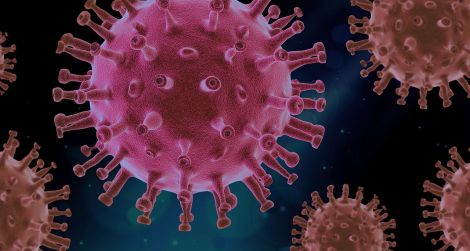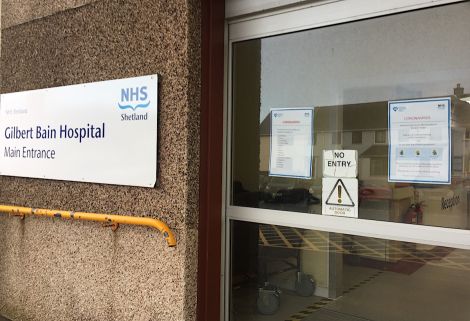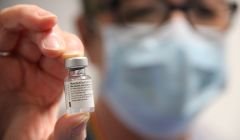Coronavirus / Health board to use local staff as ‘far as possible’ for Covid-19 contact tracing
Details also being finalised over how swab kits will be sent to Glasgow quickly as criteria for testing widens to anyone with symptoms
NHS Shetland says it will continue to use its own staff as far as possible as it moves into the contact tracing phase of the response to Covid-19.
It comes as anyone aged over five in the UK can now ask to be tested for Covid-19 if they have the recognised symptoms – a continuous cough, high temperature, or loss of sense of taste or smell.
The expansion in testing, which includes self-swab kits delivered by couriers, was announced on Monday (18 May).
NHS Shetland’s consultant in public health Susan Laidlaw said the scheme would see all swabs be sent to Glasgow, with the local health board finalising details of how to get tests sent to that laboratory within 24 hours.
She said the hope is that test kits would be sent to folk in Shetland generally the same day, although there will be “alternative processes put in place for people in the remote isles”.
The Scottish Government recently announced its intention to move towards a ‘test, trace, isolate, support’ programme which would be used to identify cases of Covid-19, find the people they have been in close contact with, and then ask those close-contacts to self-isolate for 14 days.
NHS Shetland chief executive Michael Dickson previously confirmed the health board was effectively waiting for a positive case before rolling out this approach.
There has not been a positive Covid-19 test result in Shetland since 20 April, but Dickson said there are still suspected cases circulating in the community.
NHS Shetland public health principal Elizabeth Robinson said there are 15 people, including the public health team, in its squad of contact tracers.
They will be required to interview people who have been in contact with a Covid-19 case to understand the type of contact and level of exposure they had with them.
Become a member of Shetland News
There is a range of criteria to decide whether someone is deemed a close or casual contact, and whether they need to be tested themselves.
“We will continue to use our own staff as far as possible, as it is much easier to contact trace when you understand the local context and situation, but if necessary we will use the national team as back up,” Robinson said.
“Most of them are doing their day jobs but are trained as contact tracers, and able to respond as needed.
“The purpose of contact tracing is to identify contacts as early as possible for isolation and treatment, and to enable prompt laboratory diagnostic testing.”
Contact tracing and testing was initially undertaken by NHS Shetland officials when the first cases were confirmed in the isles in March, but the national testing strategy changed once the outbreak became more widespread – with people generally asked to self-isolate if they had symptoms.
First minister Nicola Sturgeon said on Monday that expanding testing to anyone with symptoms will be “helpful as we build towards our strategy of test, trace, isolate and support – something that will be especially important as we start to emerge gradually from lockdown”.
People are able to book a test online which would be generally be carried out at drive-through or mobile test centres, but for people unable to access these – such as folk in Shetland – home kits will be available.
Priority will continue to be given to those who are key workers.
Tests were previously available to over-65s, key workers and to anyone who needed to work outside of their home. They were also available to household members of those groups.
NHS Shetland’s consultant in public health Susan Laidlaw said: “This is the expansion of the UK government testing scheme which consists of drive through centres, mobile units and self-swabbing kits distributed by couriers.
“All the swabs from this scheme go to the Glasgow Lighthouse Lab, not to local NHS laboratories. As previously reported, this is not yet running in Shetland. In most other areas this has been implemented by the Government without requiring input from NHS Boards.
“However, because it has been more challenging to provide this service in Shetland, we have been working really hard with the national team to provide local solutions to help get it implemented here as soon as we can.
“We are really keen to get more people tested if they may have symptoms of Covid-19 and this is the only way of being able to access the expansion in Scottish testing capacity.
“When it is in place, we will have a local system for requesting the test kits and getting them sent out to people generally the same day. They then have to be returned to the Glasgow Lighthouse Lab within 24 hours which is logistically challenging for Shetland, but we are now finalising the details of that process. There will be alternative processes put in place for people in the remote isles.
“In the meantime, there is an extensive list of people who can be tested through local NHS services on the advice of a clinician and we are being flexible with this to make the best use of the testing capacity that we have here.”
With the scheme utilising the Glasgow laboratory, there are no plans to increase local testing capacity, Laidlaw said.
“Local capacity is currently primarily used for the most vulnerable and highest risk people in hospital and care homes, and key workers, she added,” and also for outbreaks and contact tracing.”
Become a member of Shetland News
Shetland News is asking its readers to consider paying for membership to get additional perks:
- Removal of third-party ads;
- Bookmark posts to read later;
- Exclusive curated weekly newsletter;
- Hide membership messages;
- Comments open for discussion.
If you appreciate what we do and feel strongly about impartial local journalism, then please become a member of Shetland News by either making a single payment, or setting up a monthly, quarterly or yearly subscription.











































































